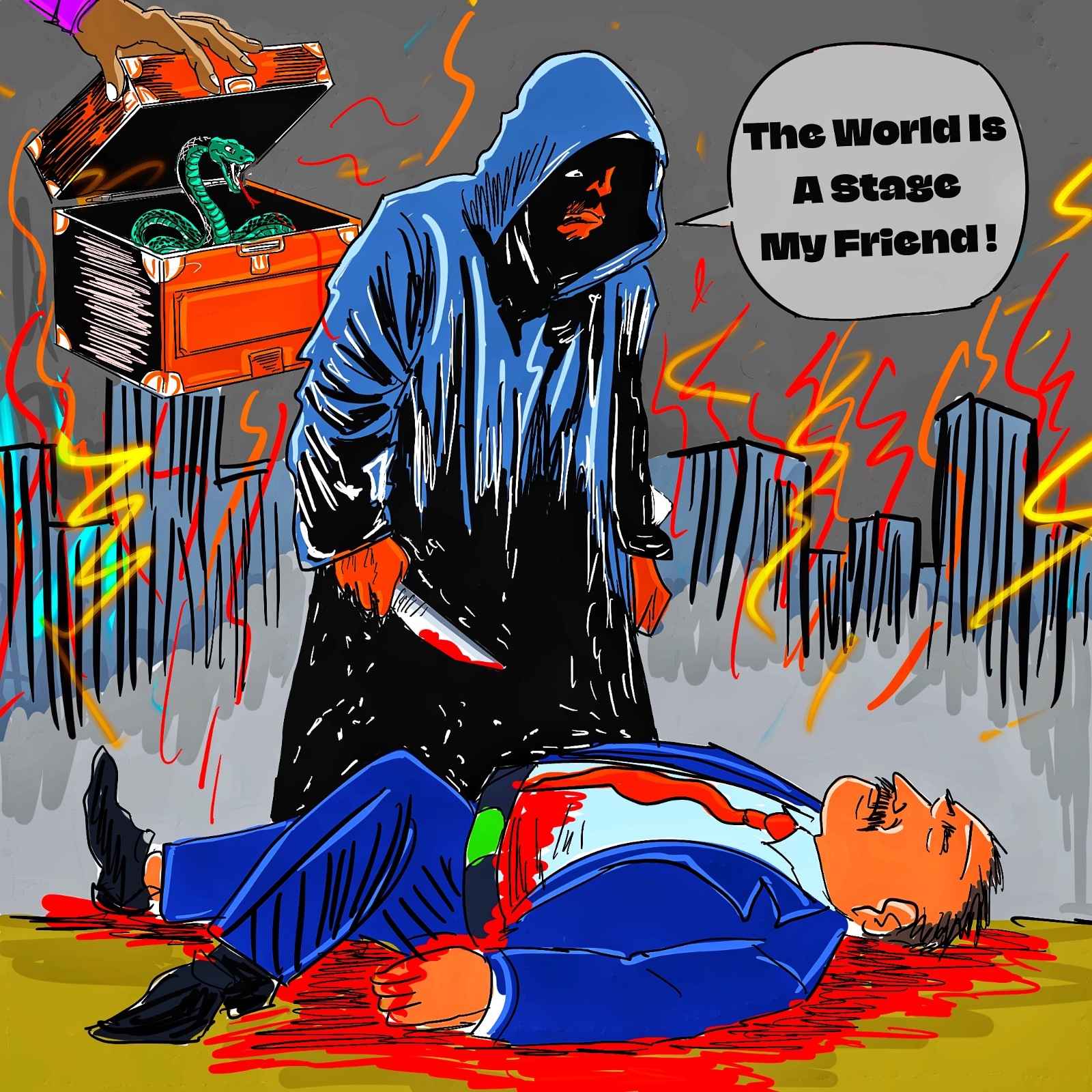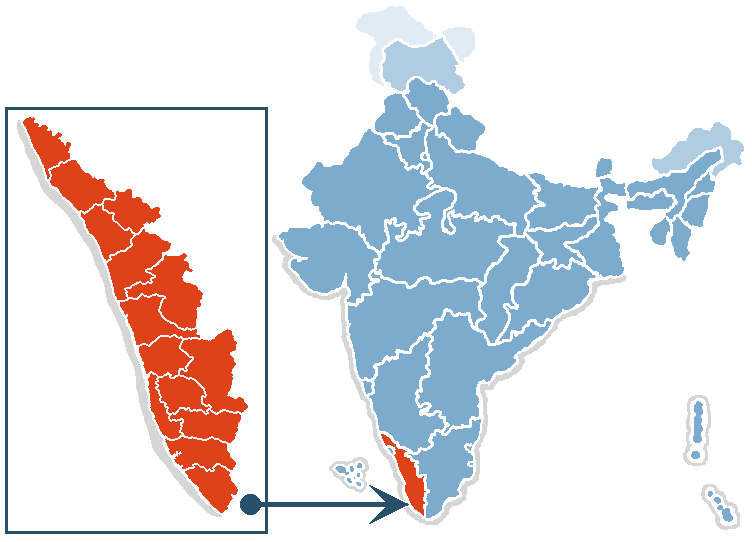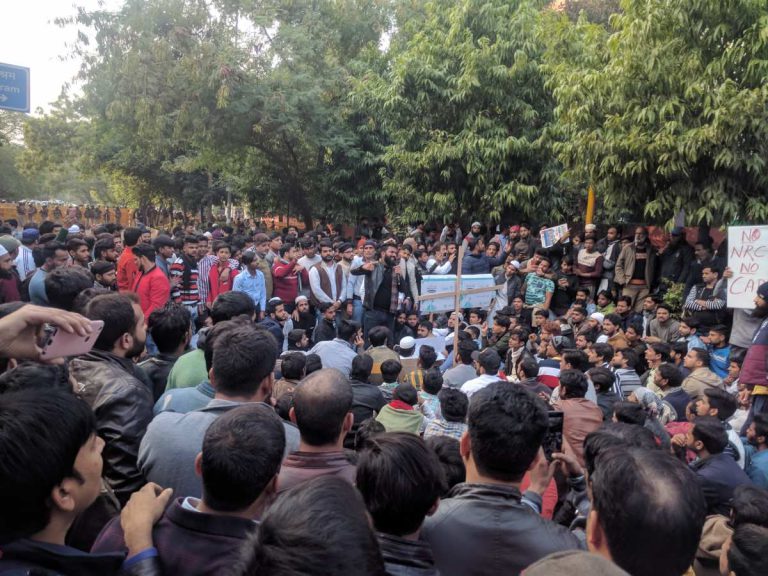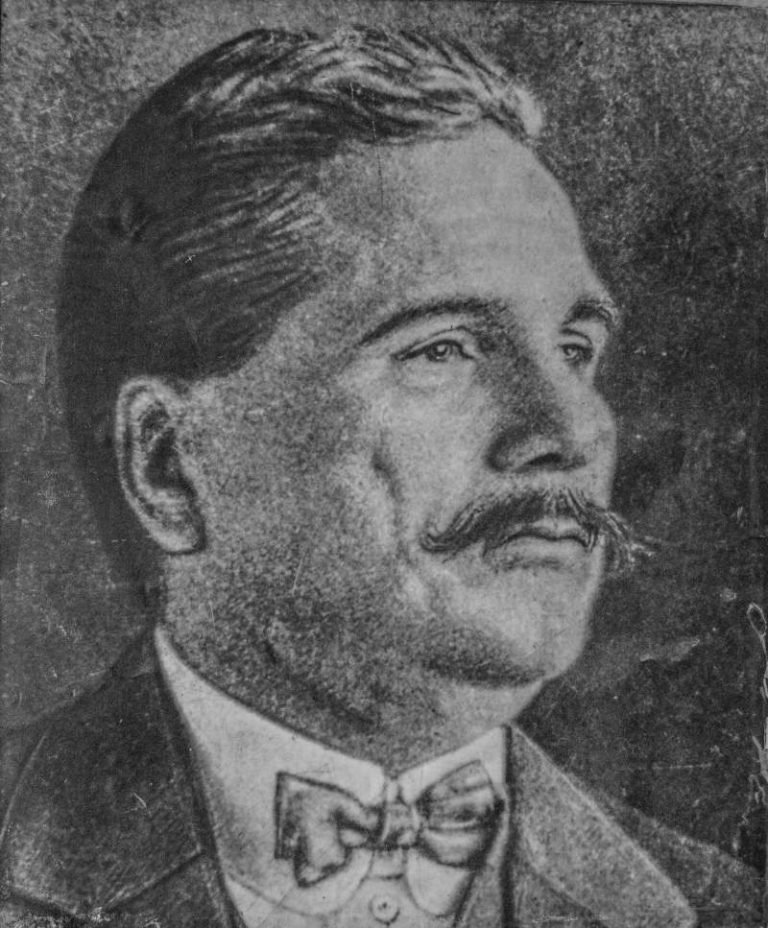Assassinations – The Poisoned Chalice
Dr. Jayan is a ‘Contributing Writer’ at the journal.
“Assassinations” – The 13-letter word in singular form evokes fear, anger, anguish and desperation simultaneously. It is not only the authorities in the highest echelons of power that are targeted but those who stood for a change and witnessed the change would later become the soft targets of some who believe the course of events was not in their favour or liking.
Mahatma Gandhi, Martin Luther King and Abraham Lincoln wanted to change a trend or an inaccurate ideology that was inhuman or unequal but had to face the inevitable. The word assassin was also used in Macbeth by Shakespeare. The powerful portrayal of Macbeth in the murder of Duncan takes us to a story filled with lust, ambition and more importantly the desire to be in power at any cost. Lady Macbeth, the brain behind the assassination, is deceptively manipulative and is waiting for a latent force to be unleashed. The words just won’t leave my mind though I learned Macbeth in grade 10, the powerful narration describes and portrays the guilt to the reader and the viewer alike.
“ All the perfumes of Arabia won’t sweeten this hand ”
Macbeth terms the assassination as the ‘poisoned chalice’.The term assassination is a word that is easy to understand but challenging to defend before a court of law or digest for those who loved or admired a person like Gandhi or Martin Luther King.
The assassination of Julius Caesar on 15th March 44 BCE by Brutus and Cassius which came to be called the Ides of March, was probably one of the earlier assassinations in recorded history. It was a pre-planned conspiracy of the Roman senators as they feared the unprecedented growing influence of Julius Caesar. The assassination contributed to the subsequent power struggles that eventually led to the rise of his adopted son Augustus Caesar. There are many down the lane in the medieval and modern history of our contemporary times who have fallen to the assassin’s bullet but left a legacy difficult to erase and ignore.
Politically, addressing movements that advocate for a country’s secession or complete independence is challenging. The principle of territorial integrity is crucial, and any compromise on this can fuel ethnic nationalism, potentially fragmenting or destabilising a nation. The breakup of the Soviet Union, Yugoslavia, and Czechoslovakia demonstrates how such divisions can have significant economic and political repercussions, leading to the emergence of new independent nations and reshaping the world map. Many leaders have resisted the self-determination of ethnic groups and were martyred. The assassination of Archduke Franz Ferdinand of Austria on June 28, 1914, by Gavrilo Princip, a member of the Black Hand, dramatically altered the course of history. The assassination not only triggered a series of events leading to World War I but also had repercussions that reshaped the global political landscape.
Interestingly, Archduke Franz Ferdinand had narrowly escaped an earlier assassination attempt that day. His decision to continue his visit, despite the warnings, ultimately led to his death and the subsequent chain reaction of historical events. It was the rise of Balkan nationalism against the dictatorships of the Austrian-Hungarian empire that triggered the conflict and World War 1 which came later.
31 October 1984, was a bright day as usual in St. Thomas Residential School, Trivandrum (Thiruvananthapuram now). I was one among the 10th graders who were asked to race to our hostels from our classrooms fearing lawlessness in the event of Indira Gandhi’s assassination on that day in the morning after 10 am. India was in the grip of a turmoil about to unfold and violence was beyond control, especially in New Delhi. Many years later, I stood in the same spot in Safdarjung Road Delhi, where she fell to the Beant and Satwant Singh’s bullets, a stark and stoic reminder of the realities which can happen to any person irrespective of the position which one holds or the riches one possesses.
Seven years later, we were woken up by an announcement in the early hours of 22 May 1991 in Tiruvalla (Keralam). I recollect the words spoken in Malayalam by the speaker moving in an autorickshaw. It said that “our PM Rajiv Gandhi was brutally murdered the previous night” (21 May) in Sriperumbudur in Madras (Chennai now). He was about to address an election rally when a lady suicide member of the then-active LTTE (Liberation Tigers of Tamil Eelam) detonated herself. India lost its second Prime Minister in seven years. The nation went through extreme grief and a deep sense of uncertainty followed. It was not the first time that PM Rajiv Gandhi faced an attempt on his life. On his return to India after signing the Indo-Sri Lankan Peace Accord, while inspecting a guard of honour from the Sri Lankan Navy on 30 July 1987, the Prime Minister narrowly avoided an attack when a young cadet attempted to strike him with a bayonet. He ducked swiftly and was promptly escorted away.
As we turn the pages of History, we find that most of the assassinations which have taken place were targeted against the Prime Ministers and Presidents of mostly ruling parties in governmental power and most of us would agree with Lord Acton’s words in this context- ‘Power corrupts and absolute power corrupts absolutely’. Both leaders met the same fate, fell to the assassin before addressing election rallies. Benazir Bhutto who was expected to take over as Pakistan’s PM for the second time was heading towards a majority in the exit polls after years of the Musharraf era. The fate that befell Rajiv Gandhi in 1991 similarly happened to her in 2007.
The Indian sub-continent has never been free of assassinations. Bangladesh, and Sri Lanka have had their share of them. General Zia-ul-Haq seized power by orchestrating the execution of Zulfiqar Ali Bhutto, the Prime Minister and leader who appointed him as the Chief of the Pakistan Army. However, Zia faced a different fate when he took off from Bahawalpur Airport in 1988. His plane was torn apart in mid-air, and despite the tragic end, a large crowd attended his funeral. The cause of the crash remains a subject of controversy and speculation. The army general and self-declared President ruled with an iron fist but his mortal remains remained scattered and dispersed, a reminder that every person has to meet the inevitable one day whether you are a king or a slave.
Mujib-ur-Rehman regarded to be the founder of Bangladesh was assassinated on 15 August 1975 through a coup d’etat orchestrated by the army itself which again showed the growing influence of the armed forces in the administration of newly formed nations which witnessed years of freedom struggle and bloodshed, quite similar to most African nations from the mid-1960s. Ironically, Mujib-ur-Rehman’s daughter Sheikh Hasina had to flee from her country after three decades in power a few days back. Former Bangladesh Prime Minister Khalida Zia’s husband, Zia ur Rahman who was the President of Bangladesh from 1977 onwards was assassinated in 1981. Paradoxically two major political parties of Bangladesh, Awami League and BNP (Bangladesh Nationalist Party) are led by the widows of two assassinated leaders.
The history of political assassinations requires careful examination from a neutral perspective. Evidence suggests that denial, suppression, and the oppression of minorities can spark revenge or retaliation, often resulting in the violent demise of individuals who may have been involved in various causes. The recent assassinations of Hamas leader Ismail Haniyeh and former Iranian army chief Qasem Soleimani underscore the complex interplay of politically motivated violence and intelligence operations. These events reflect how geopolitical tensions can escalate into targeted actions driven by strategic interests, leaving a lasting impact on regional stability and international relations which do leave lasting scars for the present and the future as the past developments led to the inevitable.
Three of the most brutal dictators of Contemporary History in my view – Adolf Hitler, Joseph Stalin and Sadaam Hussein were not surprisingly assassinated. Hitler survived five major attempts, the most significant one being the Burgerbraukeller brewery attempt by Georg Elser, a carpenter and die-hard communist who was opposed to the ideological spread of Nazisim and the brutal force which accompanied it. He anticipated the brutalities which were to follow in Hitler’s regime and considered it his duty to get rid of him to save Germany from unexpected darkness and turmoil. Elser after days of meticulous planning and prescience in his mission had successfully planted the bomb which was built with a 144-hour timer and was set to explode on November 8, 1939, at 9.20 pm roughly midway through Hitler’s planned speech. Hitler due to preoccupations and in a hurry to reach Berlin rescheduled his speech timing to 8 pm. The Fuhrer concluded his speech by 9.07 and by 9.12 he had left the premises of the building. To Elser’s misfortune and Hitler’s fortune, the bomb went off eight minutes later. The planning was perfect but the development was ill-timed. If Elser’s plan had worked perhaps the world would have been saved from another World War or a catastrophe unparalleled or unimaginable to humanity.
While Adolf Hitler took his life, Georg Elser was dragged from his cell and executed by the SS (Schutzstaffel, the personal protection group of Hitler) in April 1945 during the last few days of the crumbling Third Reich. The American invasion of Iraq in 2003 witnessed the fall of Saddam. The bearded Saddam Hussein with his unkempt hair was stretched out by the American special forces from his bunker in his hometown in Tikrit and later hanged after almost years of trial. The one who stoked fear among his countrymen for 24 years with impunity finally was lifeless in seconds in the hands of the hangman.
The United States which has had a successful Presidential System of elections and governance since George Washington assumed power in 1789 hasn’t eliminated or escaped the fate called Assassinations. It was John Wilkes Booth for Abraham Lincoln and Lee Harvey Oswald for John F. Kennedy. The actions of the two assassins took the world by storm and altered the geo-political equations significantly. In these two tragedies, many commonalities and differences emerge. Both assassinations occurred after major political developments – the American Civil War for the former and the Cold War for the latter. Both Presidents fell to single assassins and both were shot before they could stand trial. Lee Harvey Oswald was shot by Jack Ruby, while John Wilkes Booth was killed by Union soldiers. Wars often conclude with the intent to have peace but the Cold War of the 1960s and the Civil War of the 1860s saw the demise of tall leaders who stood for a cause. Both assassinations have a Ford connection- Lincoln was shot in the Ford theatre while watching ‘Our American Cousin’ while Kennedy was shot in a Ford car. Lincoln was succeeded by Andrew Johnson and Kennedy by Lyndon B. Johnson who was sworn in while on board.
The thought of Martin Luther King Jr. instantly evokes the powerful words of his legacy, words that resonate and reverberate through time, touching the hearts of good souls everywhere, regardless of their origins. ‘I have a dream. I have a dream that one day that this nation will rise up and live up to the true meaning of its creed. We hold these truths to be self-evident that all men are created equal. I have a dream that my four little children will live in a nation that will not be judged by the colour of their skin but by the content of their character’ Dr.Martin Luther King who was greatly influenced by Mahatma Gandhi and who revolutionized the Civil Rights Movement fell to the assassins bullets while standing on the balcony of Lorraine Motel in Memphis on April 4, 1968.
In parliamentary democracies, the line of succession is clear in terms of constitutional norms and procedures set in place but when dictatorships and dictators disappear the repercussions which follow for a nation are multi-dimensional as legal and political systems are intertwined in line with the dictator’s ideology or preferences. Donald Trump escaped an attempt on his life but the question remains – Will this event secure his victory in the upcoming November Presidential elections?
Assassinations do offer introspection and open a pandora box in terms of perspectives and the underlying causes which do have major political and social undercurrents in addition to electoral outcomes as was seen in the elections after Indira Gandhi’s assassination which saw Rajiv Gandhi securing a landslide victory. So an assassination is a poisoned chalice which can offer remorse to few or many depending on the impact which the leader would have had.
References
- “6 Assassination Attempts on Adolf Hitler.” History.Com, A&E Television Networks, www.history.com/news/6-assassination-attempts-on-adolf-hitler. Accessed 15 Aug. 2024.
- “The Assassination of Archduke Franz Ferdinand.” History.Com, A&E Television Networks, www.history.com/news/the-assassination-of-archduke-franz-ferdinand. Accessed 11 Aug. 2024.
- “Freedom’s Ring ‘I Have a Dream’ Speech.” The Martin Luther King, Jr. Research and Education Institute, kinginstitute.stanford.edu/king-resources/freedoms-ring-i-have-dream-speech. Accessed 15 Aug. 2024.
- Wallenfeldt, Jeff. “assassination of John F. Kennedy”. Encyclopedia Britannica, 1 Aug. 2024, https://www.britannica.com/event/assassination-of-John-F-Kennedy. Accessed 10 August 2024.








